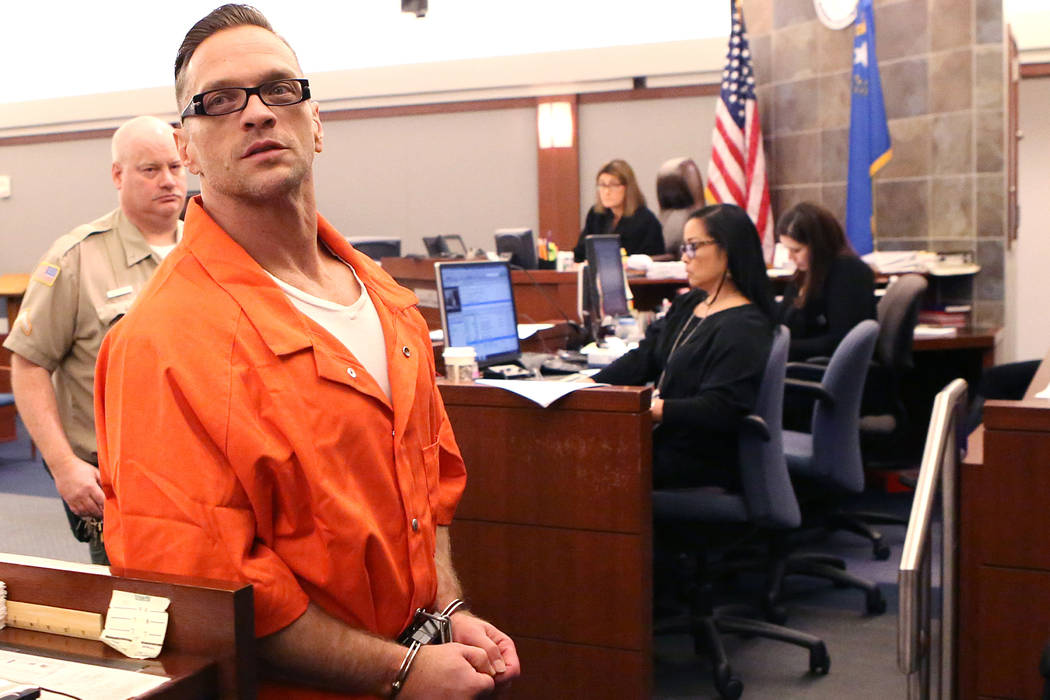Condemned Nevada prisoner’s lawyers push for execution details
Lawyers for condemned Nevada prisoner Scott Dozier, who has pushed for his own execution, told a judge Tuesday that the state still has not revealed critical details of his lethal injection scheduled for November.
Assistant Federal Public Defender David Anthony said lawyers from the attorney general’s office have offered “no communication whatsoever” regarding the state’s plans.
“Once they disclose their protocol, we’ll know what is going to happen,” Anthony told reporters.
District Judge Jennifer Togliatti scheduled a hearing for Sept. 11, when the attorney general’s office is expected to turn over documents that lay out the execution protocol. But at that point, the documentation would only be for “attorney’s eyes,” and not open to the public.
Ann McDermott, with the attorney general’s office, told the judge that revealing the details of the state’s confidential execution manual could create security problems within the prison system.
Dozier’s lawyers have filed court papers to ensure that the death penalty is carried out legally.
The prisoner was not in court Tuesday, but he has repeatedly said he wants to end his appeals and be put to death. He also told Togliatti that he would not be deterred by a potentially problematic lethal injection.
While the state has not executed an inmate in more than a decade, corrections officials have said they can carry out a fatal injection, despite previous reports of futile efforts to obtain the necessary drugs.
The Nevada Department of Corrections has listed the three drugs expected to be used for Dozier’s Nov. 14 execution: diazepam, which is normally used to treat anxiety and muscle spasms; fentanyl, used for pain; and cisatracurium, a skeletal muscle relaxant. The department has not disclosed how it obtained the drugs.
Last week, the department released documentation showing that the drugs had been purchased from Ohio-based Cardinal Health in May. The documentation also included expiration dates for the drugs. The diazepam expires in May, the cisatracurium expires in July, and the fentanyl expires in February 2019.
Dozier was sent to Nevada’s death row nearly 10 years ago for his second killing. Last year he sent a letter to the judge, requesting that his appeal process cease and that he “be put to death.”
A Clark County jury convicted him in September 2007 of killing 22-year-old Jeremiah Miller at the now-closed La Concha Motel and robbing him of $12,000 that Miller had brought from Phoenix to purchase materials to make methamphetamine.
Miller’s torso, cut into two pieces, was found in April 2002 in a suitcase in a trash bin at an apartment complex. His head, lower arms and lower legs never were recovered.
In 2005, Dozier was convicted in Arizona of second-degree murder and given a 22-year prison sentence. In that case, prosecutors said he shot and killed a 27-year-old man, stuffed his body into a plastic container and dumped it in the desert near Phoenix.
Dozier would be the first inmate executed in a Nevada prison since 2006.
A spokesman for the American Civil Liberties Union of Nevada, Wesley Juhl, attended Tuesday’s hearing.
“We just want to make sure that if the state’s going to resume executing again, that it’s done in a way that’s humane and constitutional,” he later told reporters. “It’s really disturbing that the state is willing to use an experimental drug combination. They’re basically using this prisoner as a guinea pig. There’s no telling what these drugs are going to do to him, or how they plan to use them. And I think it’s really upsetting that the state is slow-walking us in terms of releasing the information.”
ACLU officials have said the combination of drugs planned for Dozier’s execution has never been used for lethal injection in any state.
Contact David Ferrara at dferrara@reviewjournal.com or 702-380-1039. Follow @randompoker on Twitter.

















